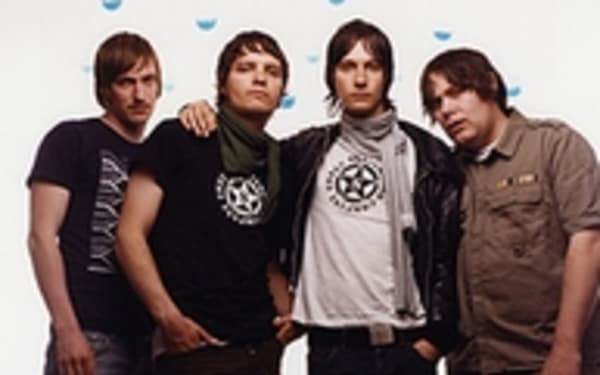Division Of Laura Lee Bio
"We set out to do our best and make a really good record and that's about it."
- PerStålberg
The Division of Laura Lee doesn't get much more serious, and singer-guitarist Per Stålberg's comment isn't just hot air from one more band with one more new album. Rather, it's a statement of intent and achievement. The actual record itself, which the Swedish quintet has dubbed Das Not Compute, is the exclamation point. And, uh, kind of a question mark.
You may remember their album of two years ago, Black City, and its groovy murk. If you don't, it somehow slinked underneath your table, it's not for lack of attention. It came like a thief in the night and rocked some souls out of a sameness-induced slumber. The band likewise toured, and fans enlisted in droves as DOLL's vastly-realized rock n' roll (a blend of Love and Rockets, U2, the Stones, the MC5, Minor Threat, Spiritualized and the Jesus and Mary Chain) reminded them why they liked music in the first place: because it was stirring emotionally and physically---it could make you rock, writhe, cry, laugh, or puke. And the problem with current music is that it just does not compute.
"I grew up listening to guitar rock," says Stålberg, "but sometimes I get really fed up with rock. And I'm bummed by the punk scene; it used to be pretty good. I don't think Division is really a punk band, but that's what we base our beliefs in. We want to just try to change things that we don't like. It's getting worse every day."
Much like a lot of other music fans, Stålberg is genuinely despondent over the state of music, and it shows on the record. Each time he sings "There's a last time for everything" on DNC's apparent final track, while steady and unwavering, he is incrementally more bummed. But that's only one track, and counts nothing for what precedes it and what follows.
Das Not Compute, recorded over three months at Svenska Grammofon Studio in Gothenburg, Sweden with Kalle Gustavsson and Don Ahlsterberg, is a dark, depressing album. It's also a happier, hopeful album, utterly bipolar in that it swings either way---not just from song to song, but within a song. "Does Compute" commences the record in a fuzzy, funky hail with Stålberg announcing, "I just wanna be nothing" then pleading, "Tell me what to do to please you/how to be good/'cause I want to...I just wanna be different/bring me back my wisdom."
Henceforth, Division embarks on a journey to make sense of their existence, the world and their work. The dance-revolt rocker "We Are Numbers" is bleak, but exhilarating in both its assertion that we are numbers ("...feeling leftover.../I am nothing"), and insistence that something be done about it. "Breathe Breathe" is the album's "Comfortably Numb," a song as soothing ("nothing here to fear, nothing to be scared of/I promise I'm your shelter when it's bad/Breathe, breathe, breathe/I'll help you through...you can trust me") as it is subtly loud. The album continues on the despair/hope trip until it culminates not in "There's A Last Time for Everything" but a sublime, Bowie-esque hidden track, "Quiet = Silence" (a quietly resolute call to arms).
Stålberg reveals, perhaps unknowingly, the source of the dichotomy/dual message.
"The last record was very dark," says Stålberg , "but it was about how it was to grow up...how hard we had it growing up. We didn't have it very easy, any of us. There was lot of drugs and violence and shit like that. I guess [Das Not Compute] is even darker...but (bassist/songwriting partner) Jonas, he thinks it's a happier record. I don't know why, though."
He reconsiders his take, and adds: "I think the whole record has got more brains than the last one. It's one more step in our mission to destroy sex-drugs-and-rock-and-roll, the whole scene. And I think we've succeeded and we're proud of it."
Indeed, they have and, while they continue to carry some degree of bleakness, they're en route to figuring things out. In crafting their extremely genuine, thoughtful, inspired rock n' roll, they've steadily carved a niche for themselves that is independent of any movement or label. And in doing so, they're satisfying their own craving for something more, something that makes sense, heading for the day when everything suddenly das compute.
Then again, maybe it's something altogether simpler.
"Division has really tried, and reached so many goals," says Stålberg . "But we're not ruling the world yet. When we do that, we can quit."


